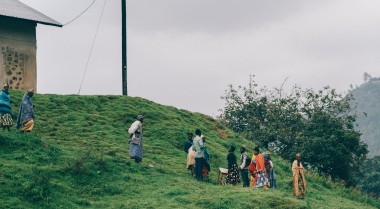How to elevate women’s role in conflict resolution?
A conversation with Joyce Ayikoru on lessons learned from Uganda by Pupul Lama.
In Yumbe District, a region in northwestern Uganda with a history steeped in conflict and displacement, Joyce Ayikoru is referred to as the “mother of the district.” Her reputation as a local leader and peacebuilder precedes her, earning her deep respect in the community.
Yumbe District is historically significant as the place where the government of Uganda and the West Nile Uganda Rescue Front 2 (UNRF 2) rebel groups signed a peace agreement in the early 2000s. This landmark agreement brought an end to a protracted conflict in the region, and Joyce played a crucial role in helping prepare negotiations for the peace agreement. However, despite her significant contributions, she and other women leaders were sidelined from the negotiation table.
Curious about her journey, I sat down with Joyce on a warm afternoon in Yumbe in May 2024, where we found respite under the shade of a tree. Joyce, with her characteristic warmth, began to share her story—a story of resilience, advocacy, and a relentless pursuit of peace.
A life dedicated to peacebuilding
Joyce’s journey in peacebuilding began in 1979, during her high school years when Idi Amin’s regime was overthrown. The West Nile region, where Joyce is from, became a battleground for rebel activities, spilling over from neighbouring Sudan and the Democratic Republic of Congo (DRC). This period of instability profoundly affected the community, particularly young women and girls, who lost educational opportunities and faced ongoing threats.
“In response to these challenges, women in my community, including myself, formed the Participatory Rural Action for Development (PRAFORD),” Joyce explains. “Our organisation was driven by our lived experiences, and we were determined to ensure that our children wouldn’t endure the same hardships.”
Her involvement in peacebuilding deepened when she received her first training in negotiations and communication, led by Stella Mystica Sabiiti, then Executive Director of the Center for Conflict Resolution (CECORE). Joyce took these skills back to her community, empowering other women, particularly those connected to rebel leaders, to play a role in stopping the violence. “These skills were pivotal in our efforts to bring peace to our region,” Joyce recalls.
Breaking barriers in peace negotiations
Despite her expertise, Joyce faced significant challenges during the 2002 peace negotiations between the Ugandan government and UNRF 2. “Women were excluded from the formal negotiations, despite our preparation and active involvement in the groundwork,” she recalls. “Even women who had supported the rebels in various capacities were overlooked, largely due to patriarchal attitudes that favoured male-dominated negotiations.”
Joyce was offered a role as a translator during these negotiations, but she refused. “I declined because I believed women deserved substantive roles in shaping the peace process,” she says. This conviction has driven her work ever since, as she continues to advocate for women's meaningful participation in peace processes.
Strengthening women’s role in peacebuilding: The power of training
As part of CECORE and PRAFORD’s long-standing partnership, Joyce played a crucial role in supporting the Rapid Response Window (RRW) project of the United Nations Women’s Peace and Humanitarian Fund (WPHF). This six-month initiative aimed to equip local women in the Yumbe District with the skills needed to resolve conflicts and build peace in their communities. Joyce facilitated training sessions on conflict resolution tools, such as conflict trees and negotiation techniques, helping women analyse conflicts, understand stakeholder interests, and employ effective mediation strategies.
Empowering women as mediators: Enhancing peacebuilding roles
The training has opened new opportunities for women to participate in peace dialogues in Yumbe District. Joyce proudly shares how women who received the training are now addressing local conflicts, such as gender-based violence, land disputes, and tensions between host and refugee communities. “These women are effectively using their skills to facilitate dialogue and promote sustainable resolutions,” she says. “Their success is changing community perceptions, especially among men, and encouraging more inclusive approaches to conflict resolution.”
Women in Yumbe have long played a vital role in resolving community conflicts, a role rooted in cultural respect for elderly women’s wisdom and experience. Joyce emphasises that, through formal conflict resolution training, women make an even bigger impact. “Women serve as crucial mediators, and their involvement is increasingly recognised by local leaders,” she notes. “This project has sparked positive changes, with communities embracing women’s leadership in resolving conflicts.”
Looking ahead: Advocating for women’s involvement in building lasting peace
Reflecting on the ongoing challenges in the region, Joyce stresses the importance of involving local leaders and women in developing tailored conflict resolution strategies. “We need training and resources in local languages to empower communities to address conflicts effectively,” she says. Quality funding, continuous training and engagement are essential to strengthen women’s capacities and ensure lasting peace.
Joyce’s story is one of resilience, determination, and an unwavering commitment to peace. Her advocacy extends beyond Yumbe District and involves international peace efforts to recognise women’s indispensable role in fostering sustainable peace. Joyce’s work in Yumbe District serves as a powerful reminder of the critical role women play in conflict resolution and peacebuilding, not just in Uganda, but around the world.
